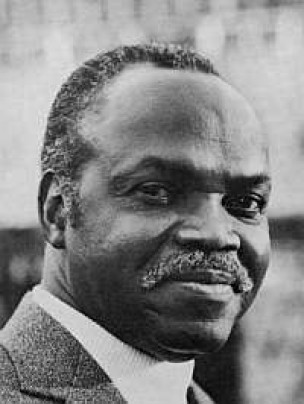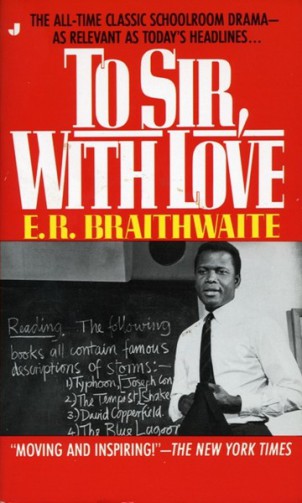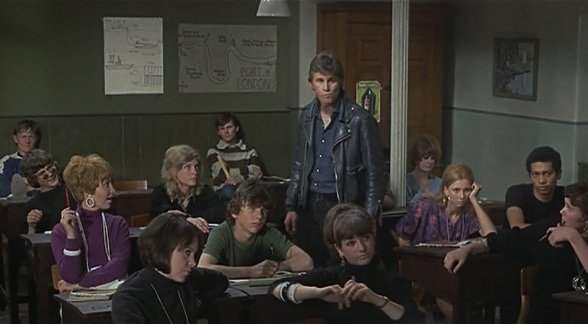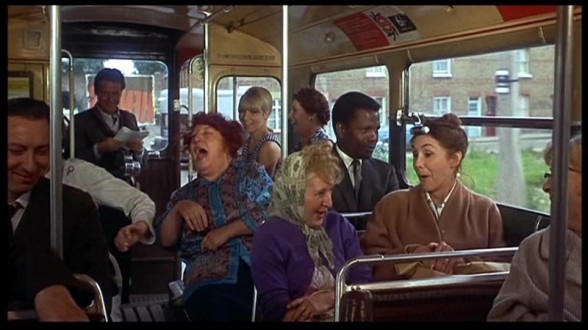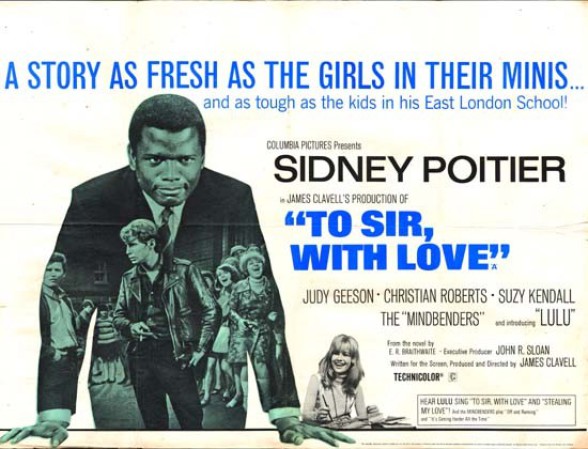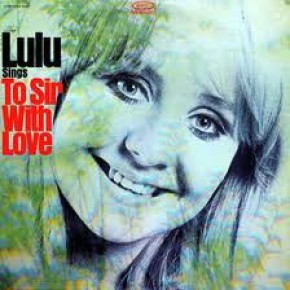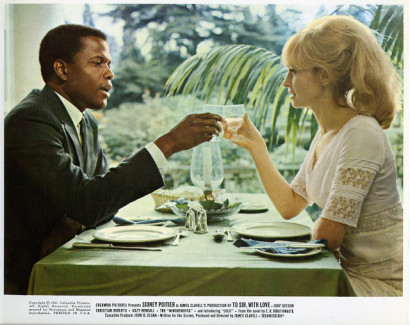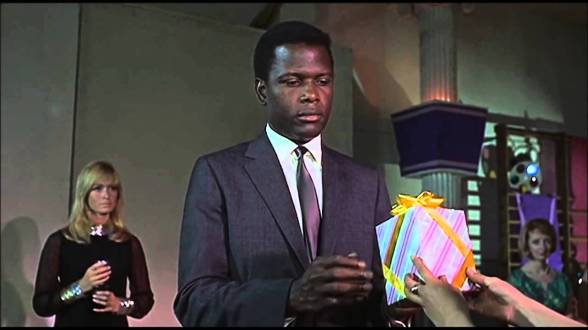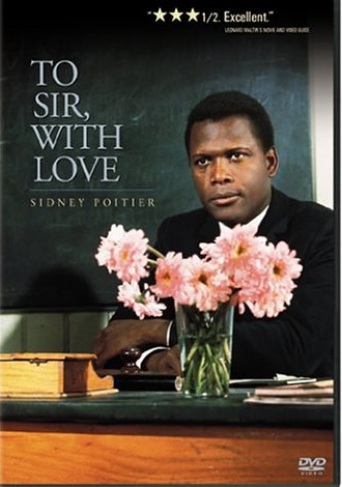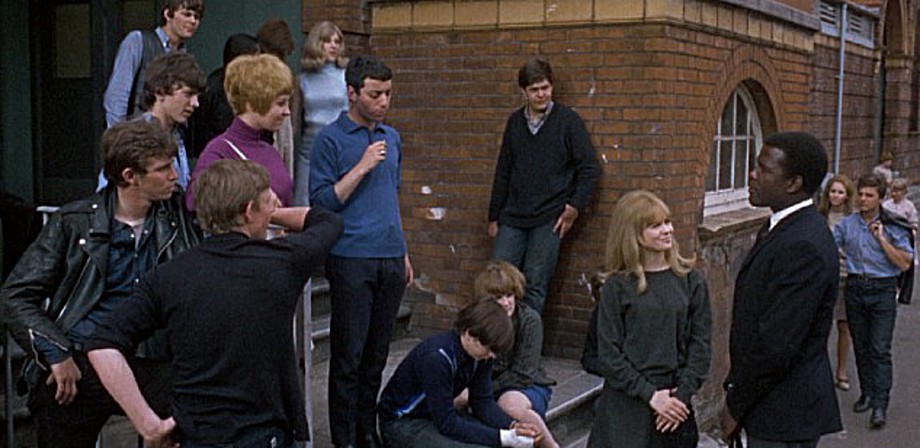
TO SIR, WITH LOVE (1967)
From the novel by E R Braithwaite published in 1959
'To Sir, With Love' was written by ER Braithwaite, and is largely autobiographical, based on his experiences as a teacher in an East End school (even the teacher in the novel is called Braithwaite). Born in British Guiana, now Guyana, possibly in 1920 (dates differ depending on the source) many of the situations and incidents described by the character in the book are clearly drawn from real-life experiences. Braithwaite himself was not terribly impressed with the finished film; he was interviewed in epsiode 3 of the BBC series 'Hollywood UK; British Cinema in the Sixties' (unfortunately I can't get hold of this clip to show) when he commented:
"Whatever was in the film, happened, but by the time the film makers got through with it, it took on a different kind of patina....I had to remind James Clavell [the writer, director and producer] on more than one occasion that my book was autobiographical, not a novel. He said, 'I'll keep it in mind' - like hell!"
To Sir, With Love (1967) was one of the most popular films of the 1960s, in fact incredibly it was the 3rd most-popular British film of the decade in the US behind two Bond films (Goldfinger and Thunderball); however the book remains a fairly obscure item - I bought my copy second-hand for a few pounds - but the differences between the book and the film make for a very interesting comparison.
The novel itself was published in 1959 - 8 years before the film version - but more importantly it is clearly referring to a decade before, the late 1940s. The book begins in May, with the main character*, as he starts teaching at a tough East End school (Greenslade School, called North Quay in the film). He reflects, in an early chapter, on how he came to be a teacher, given that he has a degree in engineering, and relates how he was demobbed, having served in the RAF, before trying to get a job. This would date his job hunting to around autumn 1945, and at one point he mentions that he has been trying to get a job, unsuccessfully (for reasons which I'll come on to) for about 18 months, which therefore dates the film to May 1947. The film ends at the end of the term just before Christmas, a period of about 8 months.
* called Ricardo/Ricky Braithwaite in the book, and Mark Thackeray in the film. I will refer to them accordingly, so when I refer to Braithwaite I mean the character in the book, and when I mention Thackeray I mean the film character played by Sidney Poitier.
Narrative
The overall tone and feel of the book and film is very similar - the story of how a reluctant teacher wins over a tough inner-city group of kids - and many of the incidents and scenes are transported directly from page to screen with very little alteration.
The famous incidents - the sanitary pad in the grate, the boxing match between Denham and Thackeray/Braithwaite, the scene where Potter is about to attack the PE teacher after Buckley collapses in the gym, the outing to the museum, Thackeray/Braithwaite cutting his hand and Pamela Dare defending him. Searles' mother's funeral - are all present, with only the boxing match having changed its position in the narrative (in the book it comes near the start, and is part of winning the whole class over whereas in the film it comes near the end). For example, here's the scene where Thackeray loses his temper, and then hits on the idea that he will treat the group as adults:
Allowing for dramtic compression, this is pretty much identical to how it happens in the book:
Matters came to a head one afternoon during recess. I had gone to the staffroom to fetch a cup of tea and returned to find the classroom smoky from an object which was smouldering in the grate of the fireplace. Several girls and boys were standing around joking and luaghing, careless of the smoke and making no attempt to smother or remove its source. I pushed through them for a closer look, and was horrified to see that someone had thrown a used sanitary napkin into the grate and made an abortive attempt to burn it.
I was so overome with anger and disgust that I completely lost my temper. I ordered the boys out of the room, then turned the full lash of my angry tongue on those girls. I told them how sickened I was by their general conduct, crude language, sluttish behaviour, and of their free and easy familiarity with the boys....
Next morning I had an idea. It was nothing clear cut, merely speculative, but I considered it all the way to school.
The rest continues as per the film, but in the book it is an untested idea, made up as he goes along, whereas in the film (for dramatic effect, understandably) it comes to Thackeray in a flash.
One interesting aside is that the film has been criticised for its lack of reality in suggesting that tough kids are going to be won over so easily, and whilst this is not invalid the book is in fact worse in this respect in my view. As an example, after the outing to the museum, the class go on a number of other trips:
About this time, with the Head's permission, several evening visits were arranged. We went to Sadlers Wells for a performance of 'Coppelia'; to the Old Vic to see Laurence Olivier in 'Hamlet'; and, as a change, we went to Wembley Stadium to see the famous Harlem Globetrotters Basketball team in action.
A load of East End kids off the see the ballet? 'Leave it aht', as they might say themselves - especially as they have to pay for the trips themselves, and they are out of school hours. In the film, noticeably, although the museum trip is a success, any future trips are cancelled by the Headmaster.
What you don't get in the book is any particular narrative structure or closure, although the school scenario, with its 'natural' cycle of terms, end of school year, moving on and new classes etc, lends itself very easily to this. The film however does seize this opportunity, and in fact the progression of the class from hooligans to reasonable students is a slow and steady one and does not take place overnight, as some reviewers have suggested. The book, strangely, is worse in this respect, with Braithwaite, in his interior monologues, sometimes veering wildy between seeing the class as angels one minute, and the next thinking it all a waste of time. When the class feel unable to take the flowers round to Searles' home as he is what we would now call mixed race but was then referred to as half-caste, Braithwaite writes:
Nothing had really mattered, the teaching, the talking, the example, the patience, the worry. It was all as nothing. They, like the strangers on buses and trains, saw only the skins, never the people in those skins."
This leads on to the big difference between the book and the film, the issue of race.
The missing theme
The issue of race is almost invisible in the film. There are a few casual references; Weston (Geoffrey Bayldon), one of the other teachers, makes some snide remarks about black magic (although even then he is a much more unpleasant character in the book), whilst Denham (Christopher Roberts), refers more than once to Thackeray as 'chimney sweep'. However no mention is made of why Thackeray has taken up a post at the school, and at least three memorable incidents in the book are dropped from the script as filmed.
Whilst the film barely refers to Thackeray's life outside of the school, in the book his background and back story is filled in in some detail. For a start, the reason he has taken 18 months to get a job is basically that as soon as he turns up for the interview, and they see that he is black, the position has mysteriously disappeared.
In certain respects, it could be argued that the film is much better without these sequences; sometimes they come across as pontificating, rather than demonstrating injustice through narrative. Chapter 4 contains about four whole pages which abandon the story and fall into the realms of the didactic essay:
"I had grown up British in every way...As a boy I was taught to appreciate English literature, poetry and prose, classical and contemporary, and it was absolutely natural for me to identify myself withe the British heroes of the adventure stories..."
He goes on:
"To many in Britian a Negro is a "darky" or a "nigger" or a "black"...and often I would hear the remark "working like a nigger" or "labouring like a black" ".
He goes on to compare the blatant racism of the USA with the casual, unspoken racism of Britain, where:
"A Negro is free to board any bus or train and sit anywhere...the fact that many people might pointedly avoid sitting near him is casually overlooked. He is free to seek accommodation in any licensed hotel or boarding house - the courteous refusal which frequently follows is never ascribed to prejudice. The betrayal I now felt was greater because it had been perpetrated with the greatest of charm and courtesy."
The book is much more successful when these thoughts and observations are made real and vivid for the reader. In the first chapter Braithwaite is on the bus to school, and listens to the banter of the women on the bus (see above). However when one of them gets off he finds that a well-dressed woman refuses to sit next to him. This scene is omitted from the film, where Poitier simply gets off the bus and goes into the school.
Arguably one of the key scenes of the book is also left out completely. In the film Rita Webb, in the still above, turns out to be the mother of one of the girls he teaches, and as she has a market stall where he buys fruit he sees her frequently and she is always very friendly towards him.
In the book however this is not the case. He lives, with an older couple who have befriended him, in Brentwood in Essex (this is briefly referred to in the film, whilst there is only one very brief scene of him at home, ironing a shirt - the only reference to his life outside of the school). As this is some way from work, he tries at one point in the novel to find a room locally, but when he goes to see about it, he finds the same old response:
I knocked and presently the door was opened by a large, red-faced smiling woman.
"Good evening. I'm here to enquire about the room."
Immediately the smile was replaced by the expression of cold withdrawal I had come to know so well.
"Sorry. I'm not letting."
..............
"Who's it, Mum?" a girlish voice enquired from somewhere behind her.
"Some darky here asking about the room". Her mouth spat out the words as if each one was intended to revile.
Embarassed to the point of anger, I was turning away when there was a sudden movement behind her and a voice cried in consternation:
"Oh Gawd, Mum, it's Sir, it's me teacher". Beside the woman's surprised face I caught a glimpse of the startled freckled countenance of Barbara Pegg. "Oh me Gawd..."
Lulu, The Mindbenders and 60s pop
Whilst not changing the general 'feel' of the film, the fact that it has been updated by 20 years, from 1947 to 1967 in effect, means that it has to be marketed in a different manner. It is certainly not promoted as a 'social problem' film, and I was very interested to hear writer/producer/director James Clavell being interviewed on the same programme as ER Braithwaite (Hollywood UK: British Cinema in the Sixties) saying that it was originally intended as a musical, using The Mindbenders and Lulu. The poster belows, referring to 'the girls in their minis', dates it straight to the mid-60s.
Along with the film itself, the theme tune was very popular too, as sung by Lulu, but bizarrely got to Number 1 in the US but did not chart in the UK, as for reasons which I don't understand it was only a B-side to another Lulu single! I remember a few years ago a very fetching version by The Trash Can Sinatras, which I have on a compilation CD called 'Crush'.
The song features a couple of times in the film - at the start, and then as background to the museum trip, before Lulu sings a section at the end. Here's the montage showing the museum trip:
As in the book, Pamela Dare (Judy Geeson) asks Braithwaite for a dance, but in the book they dance to a song called 'in the still of the night', which is a Ladies' Excuse-Me Foxtrot - this is in stark contrast to Pamela and Thackeray dancing to The Mindbenders peforming 'It's getting harder all the time'.
Sir and Miss Blanchard
Given the lack of any background to Thackeray's story in the film, it is perhaps no surprise that his relationship with one of the other teachers, Gillian Blanchard, is only hinted at in the film (although it would have made sense in a film which was aiming at populist appeal, happy ending and all that).
I have mentioned on other pages on this website that I do have a strange fascination with publicity material that is not related to the film, so I was very pleased to eventually find this still/poster (right) that shows Poitier and Kendall in a restaurant, which does not feature in the film, or indeed anything like it. In the book Braithwaite and Blanchard not only start a relationship, they have plans to marry and there is a scene, reminiscent for me of Flame in the Streets, where he meets her enlightened-but-still-prejudiced parents.
Ending
I do find the end (at the party anyway) rather mawkish, but in fact there is a much stronger cyclical feel to the film than the book. Whilst it is not clear when Thackeray starts at the school, he is all set to leave the school and indeed the teaching profession at the end of the year, when the class leave; he has been writing off applying for several jobs and secures a job with an engineering firm in the Midlands. However he realises that next year he will have another class to mould, and tears up the job offer letter.
There is no sense of this cycle in the book, where he is simply presented with a gift (we never find out what it is) by the class and the book ends with him and the headmaster examining the parcel:
Together we looked at the large label pasted on the parcel and inscribed:
TO SIR,
WITH LOVE
and underneath, the signatures of all of them.
He looked at me and smiled. And I looked over his shoulder at them - my children.
This is actually much more sentimental than the film in some respects, and despite the criticism of the film in some quarters for its lack of realism, the book suffers from the author being unsure whether the transformation he has wrought is real or likely to last. At least in the film it is made clear, in the last scene, that Thackeray is not going to have an easy time from now on but that the struggle to communicate anything, let alone teach, is going to be a constant and never ending struggle:
Further reading/viewing
The DVD is less than £5 to buy, although it can also be seen in its entirety on youtube, whilst the book can be bought at www.abebooks.co.uk for less than £2, not much more than jumble sale price. According to wikipedia I found that there is a book by Alfred Gardner called 'An East End Story' which challenges Braithwaite's reminiscences, but I can't get this book from the library and it's about £8-£9 to buy second-hand. I would be very interested to get hold of it though, as I am not convinced by some of Braithwaite's reminiscences - especially the bit about going to see Coppelia...
Stop press 19 Dec 2013: I was actually contacted by Alfred Gardner a couple of days ago, and I rang him this morning. It was fascinating to talk to him; his book has been republished this year, and I am determined to get hold of it, it sounds very interesting. Mr Gardner described how Braithwaite was quite a martinet, and how the school felt he had done them a disservice in writing 'To sir, with love', and I was pointed towards Professor Michael Fielding's writings on Alex Bloom, who was the headmaster at St George-in-the East in Stepney from 1945-1955 (hope I've got my facts right there).
Mr Gardner also mentioned 'The Braithwaite Knock', where Braithwaite would come up and hit a pupil on the back of his head to attract his/her attention.
Stop press Jan 2017: Mr Gardner has sent me the following document, which I have uploaded here with his permission. It certainly gives an alternative view of the real Braithwaite.
Adobe Acrobat document [372.1 KB]
